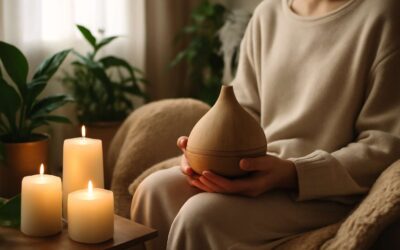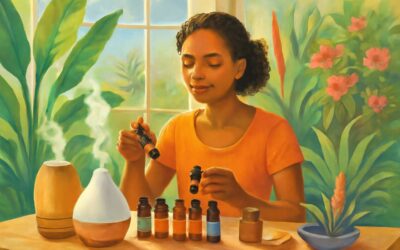
There are many health benefits to using an aromatherapy diffuser, including reducing stress, boosting your immune system and providing a natural mood boost. But you may be wondering how a diffuser works or what you should know before buying one.
Essential Oil Diffuser Explained
An aromatherapy diffuser is an electric device that turns liquid essential oils into a fragrant mist. They are also a great way to inhale essential oils without having to put them on your skin. There are a variety of different types of aromatherapy diffusers, from nebulizers to ultrasonic and heat diffusers, but all work in similar ways to deliver a fragrant vapor into the air.
A nebulizer breaks down essential oils into smaller molecules before dispersing them, which can be more effective than using other diffuser methods. This is particularly beneficial for people with asthma or other respiratory conditions as it allows more medication to be delivered into the lungs over time.
Nebulizers can be found in various shapes and sizes, with many incorporating an unusual blown-glass piece that holds the essential oils. They are often used in professional environments and in homes to enhance the scents of a room and create a calming atmosphere.
Essential Oil Diffuser Safety Tips
Before diffusing essential oils, check with your doctor or other health professional to ensure that you’re not allergic or prone to any other health issues. You should also check with your veterinarian or local animal shelter to ensure that you’re not putting anything dangerous into your home.
You should never leave an essential oil diffuser running when you’re not home and should use it sparingly, especially around pets or children. Some oils are harmful to animals and can cause vomiting or diarrhea, while others can be toxic if inhaled by anyone with an allergy.
It is important to follow the manufacturer’s instructions for each type of diffuser. If you are unsure what amount of oil to add, it is best to start small and gradually increase the amount over time until you find the right ratio.
To get the most out of your diffuser, it’s also helpful to experiment with different oils and blends. For instance, bergamot is known for its uplifting properties while cardamom can help with focus and clarity. Or try a blend of geranium, frankincense and mandarin for a gentle, soothing scent.
The ideal ratio of water to essential oils is between 3 and 6 drops per 100 ml, but this can vary from diffuser to diffuser. You should always check the manufacturer’s instructions to make sure that you’re using the correct amount of water and oil in your diffuser.
When selecting an essential oil, it’s important to choose a high-quality, therapeutic grade. If possible, you should also avoid synthetic fragrances. They are usually low in quality and will not produce the same results as naturally derived oils.
There are a number of different benefits to diffusing essential oils, but you should remember that it is best to use them safely and regularly. This is especially important if you’re pregnant, breastfeeding or have young children at home.


0 Comments